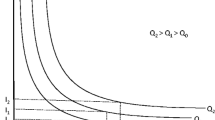Abstract
This paper asks the question: do people with different levels of research productivity and identification as a researcher think of research differently? It discusses a study that differentiated levels of research productivity among English and Australian academics working in research-intensive environments in three broad discipline areas: science, engineering and technology; social science and humanities; and medicine and health sciences. The paper explores the different conceptions of research held by these academics in terms of their levels of research productivity, their levels of research training, whether they considered themselves an active researcher and a member of a research team, and their disciplinary differences.
Similar content being viewed by others
References
Åkerlind, G. S. (2008). An academic perspective on research and being a researcher: An integration of the literature. Studies in Higher Education, 33(1), 17–31.
Archer, M. S. (2000). Being human: The problem of agency. Cambridge: Cambridge University Press.
Archer, M. S. (2007). Making our way through the world: Human reflexivity and social mobility. Cambridge: Cambridge University Press.
Boud, D., & Lee, A. (Eds.). (2009). Changing practices in doctoral education. London: Routledge.
Bowden, J., Green, P., Barnacle, P., Cherry, N., & Usher, R. (2005). Academics’ ways of understanding success in research activities. In J. A. Bowden & P. Green (Eds.), Doing developmental phenomenography (pp. 128–144). Melbourne: RMIT University Press.
Brew, A. (2001). Conceptions of research: A phenomenographic study. Studies in Higher Education, 26(2), 271–285.
Brew, A., & Boud, D. (2009). Understanding academics’ engagement with research. In A. Brew & L. Lucas (Eds.), Academic Research and Researchers (pp. 189–203). London: SRHE and the Open University Press.
Brew, A., & Lucas, L. (2009). Academic research and researchers. Maidenhead, UK: McGraw Hill, Society for Research into Higher Education and the Open University Press.
Bryans, P., & Mavin, S. (2006). Visual images: A technique to surface conceptions of research and researchers. Qualitative Research in Organizations and Management, 1(2), 113–128.
Dever, M., & Morrison, Z. (2009). Women, research performance and work context. Tertiary Education and Management, 15(1), 49–62.
Edgar, F., & Geare, A. (2013). Factors influencing university research performance. Studies in Higher Education, 38(5), 774–792.
Fisher, R. L. (2005). The research productivity of scientists: how gender, organisation culture and the problem choice process influence the productivity of scientists. Oxford, UK: University Press of America.
Fox, M. (2005). Gender, family characteristics, and publication productivity among scientists. Social Studies of Science, 35(1), 131–150.
Grapin, S. L., Kranzler, J. H., & Daley, M. L. (2013). Psychology in the schools: Scholarly productivity and impact of school psychology faculty in APA-accredited programs. Psychology in the Schools, 50(1), 87–101.
Hasselgren, B., & Beach, D. (1997). Phenomenography: A “good for nothing brother” of phenomenology? Higher Education Research and Development, 16(2), 191–202.
Kiley, M., & Mullins, G. (2005). Supervisors’ conceptions of research: What are they? Scandinavian Journal of Educational Research, 49(3), 245–262.
Kim, D., Wolf-Wendel, L., & Twombly, S. (2011). International faculty: Experiences of academic life and productivity in U.S. universities. Journal of Higher Education, 82(6), 720–747.
Kyvik, S. (2013). The academic researcher role: Enhancing expectations and improved performance. Higher Education, 65, 525–538.
Lee, S., & Bozeman, B. (2005). The impact of research collaboration on scientific productivity. Social Studies of Science, 35(5), 673–702.
Lucas, L. (2006). The research game in academic life. Maidenhead, UK: Open University Press and the Society for Research into Higher Education.
Marton, F., & Booth, S. (1997). Learning and awareness. Mahwah, NJ: Lawrence Erlbaum.
Meyer, J. H. F., Shanahan, M. P., & Laugksch, R. C. (2005). Students’ conceptions of research: I—a qualitative and quantitative analysis. Scandinavian Journal of Educational Research, 49, 225–244.
Padilla-Gonzalez, L., Metcalfe, A. S., Galaz-Fontes, J. F., Fisher, D., & Snee, I. (2011). Gender gaps in North American research productivity: Examining faculty publication rates in Mexico, Canada, and the U.S. Compare: A Journal of Comparative and International Education, 41(5), 649–668.
Prosser, M., & Trigwell, K. (1999). Understanding learning and teaching: The experience in higher education. Buckingham: Society for Research in Higher Education and the Open University Press.
Prosser, M., Martin, E., Trigwell, K., Ramsden, P., & Middleton, H. (2008). University academics’ experience of research and its relationship to their experience of teaching. Instructional Science, 36(1), 3–16.
Quimbo, M.-A. T., & Sulabo, E. C. (2014). Research productivity and its policy implications in higher education institutions. Studies in Higher Education, 39(10), 1955–1971.
Serenko, & Bontis, (2004). Meta-review of knowledge management and intellectual capital literature: Citation impact and research productivity rankings. Knowledge and Process Management, 11(3), 185–198.
Smeby, J. C., & Try, S. (2005). Departmental contexts and faculty research activity in Norway. Research in Higher Education, 46(6), 593–619.
Stack, S. (2004). Gender, children and research productivity. Research in Higher Education, 45(8), 891–920.
Stubb, J., Pyhältö, K., & Lonka, K. (2014). Conceptions of research: The doctoral student experience in three domains. Studies in Higher Education, 39(2), 251–264.
Vermunt, J. (2005). Conceptions of research and methodology learning: A commentary on the special issue. Scandinavian Journal of Educational Research, 49(3), 329–334.
Visser-Wijnveen, G. J., Van Driel, J. H., Van der Rijst, R. M., Verloop, N., & Visser, A. (2009). The relationship between academics’ conceptions of knowledge, research and teaching—a metaphor study. Teaching in Higher Education, 14(6), 673–686.
Acknowledgments
Grateful thanks are due to Peter Petocz for providing helpful comments on an earlier draft of this paper. The survey design and its Australian implementation were funded by a grant from The University of Sydney.
Author information
Authors and Affiliations
Corresponding author
Rights and permissions
About this article
Cite this article
Brew, A., Boud, D., Namgung, S.U. et al. Research productivity and academics’ conceptions of research. High Educ 71, 681–697 (2016). https://doi.org/10.1007/s10734-015-9930-6
Published:
Issue Date:
DOI: https://doi.org/10.1007/s10734-015-9930-6




